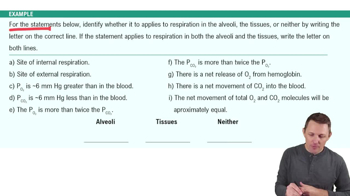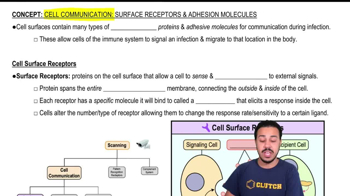Here are the essential concepts you must grasp in order to answer the question correctly.
Surfactant
Surfactant is a substance that reduces surface tension in liquids. In the lungs, surfactant is produced by alveolar cells and plays a crucial role in preventing the collapse of alveoli by decreasing the surface tension of the fluid lining them. This allows for easier expansion during inhalation and helps maintain proper lung function.
Recommended video:
Pressure in the Lungs and Pleural Cavity Example 1
Alveoli
Alveoli are tiny air sacs in the lungs where gas exchange occurs. They are surrounded by a thin layer of fluid, which is essential for the diffusion of oxygen and carbon dioxide. The presence of surfactant in the alveoli is vital for keeping them open and functional, ensuring efficient respiratory processes.
Recommended video:
Surface Tension
Surface tension is the cohesive force at the surface of a liquid that causes it to behave like a stretched elastic membrane. In the context of the alveoli, high surface tension can lead to collapse, making it difficult for the lungs to inflate. Surfactant reduces this tension, allowing the alveoli to remain open and facilitating normal breathing.
Recommended video:
 Verified step by step guidance
Verified step by step guidance


